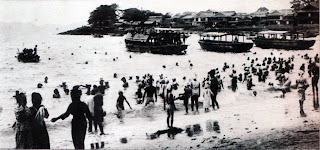This day by water to Nezumi Jima: Mouse Island, so called, presumably, on the locus non lucendi principle, as careful observation fails to discern the faintest resemblance to the rodent which is the terror of the munitioneering sex. Nezumi is a small island situated about three quarters of a mile below the quarrantine station, its sole attraction being its fine, sandy beach and the facilities provided for sea bathing.
Nezumi Jima
Tickets were accordingly purchased, but observing the crowded states of both steamer and passenger scows, a condition which might aptly be termed “Japonaise a la sardine,” the party chartered a sampan for the day and in due course reached the island after a more comfortable, if not safer, trip.
On arrival, the water and beach were found to be crowded with swimmers, paddlers and ‘bleachers’ (tanners, possibly would be the more appropriate term for the latter). For a couple of sen a large mat could be hired to spread on the sandy beach and so form a seat for the lessee.
Echigo
The difficulty, however, appeared to lie in finding a vacant patch, but after considerable exploring, together with the good-natured moving closer together of mats spread on pre-empted spaces, room was ultimately found for the party, the mats spread and the refreshments duly opened.
Being the sole foreigner on the whole beach - presumably also on the whole island - the Pilgrim preferred not to bathe and, being abandoned by the other members of the party to his own devices, he lay back, “twigging moves” and absorbing ‘atmosphere’ and local colour.
Of the latter, excluding the blue sky and water, the island itself, tree covered from the line of the beach to its summit; the prevailing tint seemed to be a rich, coppery brown. It being holiday time, many of the swimmers came day after day, bringing their food and remaining in and out of the water from morning to sunset.
How these people do enjoy themselves and how little their simple pleasures seem to cost - ten sen, a couple more for a mat, large enough for two, a little rice (with trimmings) brought in a small wooden box - the price of a day's outing!
Among the crowd of bathers were a number of students (one hardly likes to term youths of 19 or more schoolboys) and part of the afternoon's fun was the “chairing” of a gentleman who, it is understood, is a popular teacher. A procession of about two hundred students took part in this event. Two by two, the younger ones first and last, all old and young, arrayed - that is, from their waists upwards - in old time costume, they marched in procession along the foreshore above high water mark.
As far as can be recalled (it being decidedly inadvisable for any foreigner to be seen with pencil and note-book within the fortified area) the order of the procession was as follows:
First, the Marshal and chant-leader, wearing a ferocious mask, headress la samurai, painted Mephistolian eyebrows and bearing his mace of office; chanting a dirge like ditty, the rest of the procession joining in with a stentorian “Ya-ho!!” at specified intervals.
Followed many pairs of youths, mounted upon bamboo sticks terminated with paper or linen horses heads, the riders of these fiery steeds all masked and coiffed similarly to the marshal. Next a pair of officials, each bearing the daimyo's card. A “Foo-foo” band, carrying and “playing” upon instruments that beggar description. A pair of officials followed, each with a long lance decorated with a mop-like plume of horse hair at its point. Then a number of guards, each carrying a gun, which latter would be snapped up with avidity by the curio collector on opportunity presenting itself. A number of carriers with bamboo poles from which were slung boxes, each bearing the daimyo's crest and purporting to contain money. Next a number of “samurai” each wearing his two swords.
In solitary state, with considerable room allowed him, followed a worthy who apparently officiated as “Koko” - not the tonsorialist of the outfit, be it observed, although nathless his business also had largely to do with the head, but the official executioner.
More guards, retainers, treasure and clothing bearers then, in the official palanquin, borne by about 40 carriers, all chanting lustily, the Daimyo himself, in the person of the popular teacher above referred to. More guards, retainers, bearers of treasure and official insignia, the long procession tailing off with masked and painted youngsters.
After parading the beach from end to end, the marshal marched down into the water, the procession following. When swimming depth was reached, with a turn to the right, at right angles to the shore line, the procession became a swimming one but still carefully maintained its line and formation although the difficulties of bearing aloft a heavy musket became evident. The Pilgrim was interested in observing the fate of the palanquin and its occupant - whether the latter would be seated Canute-like, at the water's edge, or would still “carry on.”
On arrival at the water's edge the chant was changed and the dirge became a rollicking, triumphant chorus. There was no stoppage; right into the water the carriers marched, bearing their daimyo and when swimming depth was reached it was apparent that the many bamboo carrying poles were sufficient to float the palanquin, the occupant being kept high and dry.
The procession kept the water until a landing was effected at the upper end of the beach. Many of the ‘properties,’ however, were much the worse for their dip in the water including (Allah be praised) the band instruments. It was all very interesting and as everyone appeared to be the soul of good nature and eager to explain incidents to the lonely foreigner, the latter for the time being forgot that, although among these happy holiday-makers, he was not of them and thus thoroughly enjoyed himself.




No comments:
Post a Comment